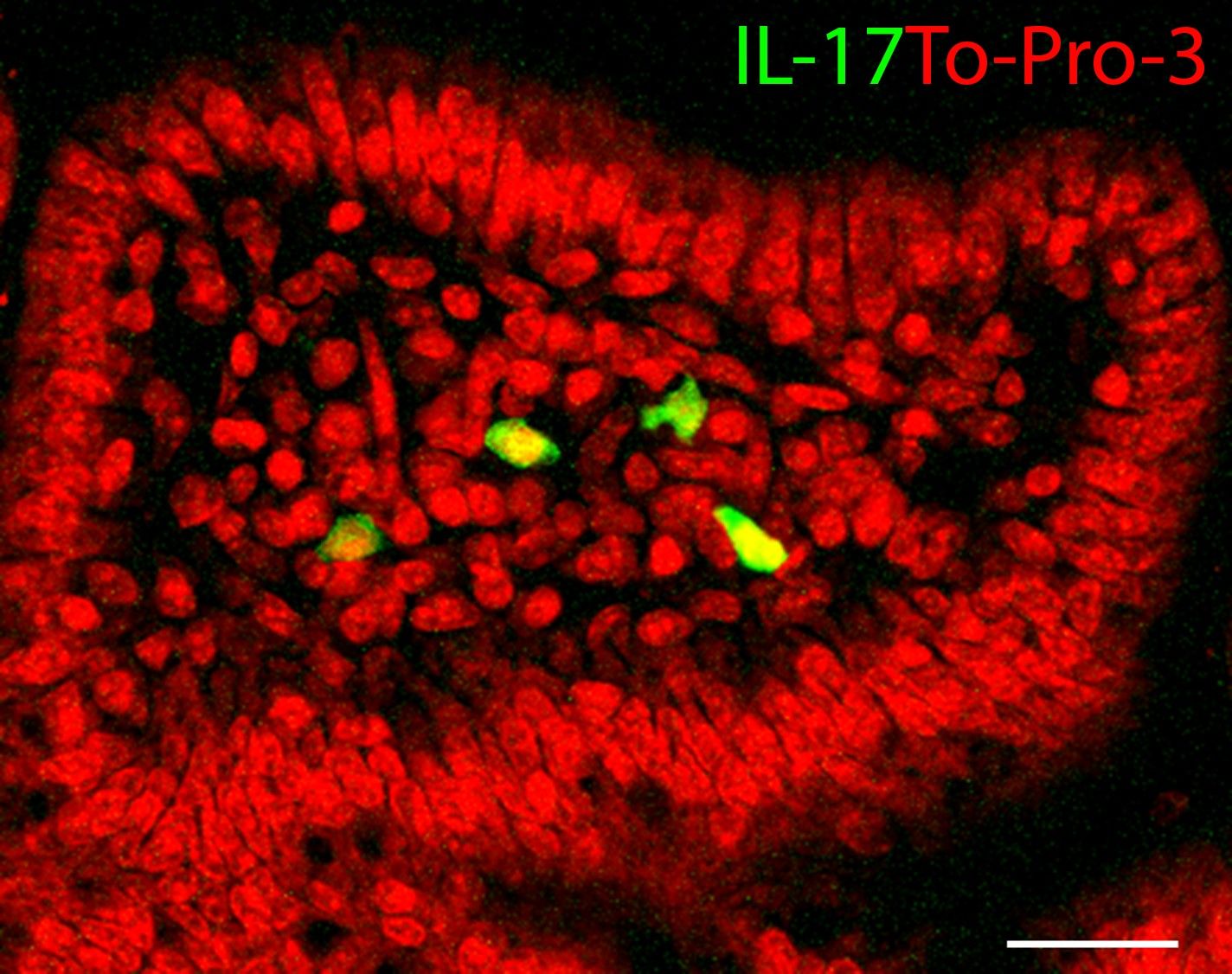
Research
Vascular risk factors have long been associated with cerebrovascular diseases and cognitive impairment including Alzheimer’s disease (AD), the most common cause of dementia in the elderly. Our research is particularly focused in elucidating the specific cellular targets through which vascular risk factors alters cerebrovascular function, and their eventual link to cognitive impairment. Since dysregulation of peripheral immune system, which is frequently associated with vascular risk factors, increases risk of dementia, we are particularly interested in uncovering the mechanistic bases of the association between immune system, cerebrovascular function, and cognitive impairment.
The lab recently discovered that dietary salt induces accumulation of hyperphosphorylated tau, followed by cognitive dysfunction. These effects are dependent on expansion of IL-17-producing T-helper lymphocytes (TH17 cells) in the small intestine, resulting in a marked increase in the cytokine IL-17 which acts on cerebral endothelial cells reducing their ability to produce nitric oxide, a crucial regulator of cerebral blood flow. These findings are intriguing because they reveal a new gut-brain axis linking dietary habits to cognitive impairment through an adaptive immune response initiated in the gut and compromising brain function via circulating IL-17. We are currently interested in understanding whether changes in gut microbiota inducing dysregulation of gut Th17 homeostasis might also promote cognitive impairment.
Figure 1. Figure 1: IL17+ cells in the lamina propria of the distal small intestine of IL-17 GFP reporter mice (scale bar: 20 μm).

Figure 2. Electron micrograph of a neocortical arteriole (diameter 10 μm). A PVM containing lysosomes (electron dense) is seen at the top right of the vessel (scale bar: 1 μm).

Figure 3. Mechanisms by which HSD leads to reduced endothelial NO availability and, in turn, to tau phosphorylation and cognitive impairment. IL-17A indicates Interleukin-17A; eNOS, endothelial NO synthase; CBF indicates cerebral blood flow; CDK5, Cyclin-dependent kinase 5; Cys-SH, cysteine thiol.

Current Projects:
- Gut microbiota and cognitive impairment.
- Molecular mechanisms underlying cerebrovascular dysfunction associated with high-salt diet
- Role of microglia in cognitive impairment associated with high-fructose corn syrup diet
- Brain perivascular macrophages and high-fat diet
Bio
Giuseppe Faraco earned his medical degree from the University of Florence, Italy in 2004 and received his PhD degree in Pharmacology from the same University in 2010. He also completed the residency in Clinical Toxicology at the University Hospital ‘Careggi’ of Florence in 2007. In 2008, he joined the lab of Prof. Iadecola at Weill Cornell Medicine, first, as visiting fellow, and then, as a post-Doc from 2010 to 2012. He joined Weill Cornell Medicine faculty in 2012 as an instructor and was later promoted to Assistant Professor in 2016.
Distinctions:
- Finbar and Marianne Kenny Research Scholar Award in Neurology (2020-2023).
Selected Publications:
Faraco G, Sugiyama Y, Lane D, Garcia-Bonilla L, Chang H, Santisteban MM, Racchumi G, Murphy M, Van Rooijen N, Anrather J, Iadecola C. Perivascular macrophages mediate the neurovascular and cognitive dysfunction associated with hypertension. J Clin Invest. 126:4674-89, 2016. https://pubmed.ncbi.nlm.nih.gov/27841763/
Benakis C, Brea D, Caballero S, Faraco G, Moore J, Murphy M, Sita G, Racchumi G, Ling L, Pamer EG, Iadecola C, Anrather J. Commensal microbiota affects ischemic stroke outcome by regulating intestinal γδ T cells. Nat Med. 22:516-23, 2016. https://pubmed.ncbi.nlm.nih.gov/27019327/
Faraco G, Brea D, Garcia-Bonilla L, Wang G, Racchumi G, Chang H, Buendia I, Santisteban MM, Segarra SG, Koizumi K, Sugiyama Y, Murphy M, Voss H, Anrather J, Iadecola C. Dietary salt promotes neurovascular and cognitive dysfunction through a gut-initiated TH17 response. Nat Neurosci. 2018 21:240-249, 2018. https://pubmed.ncbi.nlm.nih.gov/29335605/
Faraco G, Hochrainer K, Segarra SG, Schaeffer S, Santisteban MM, Menon A, Jiang H, Holtzman DM, Anrather J, Iadecola C. Dietary salt promotes cognitive impairment through tau phosphorylation. Nature. 574:686-690, 2019. https://pubmed.ncbi.nlm.nih.gov/31645758/
